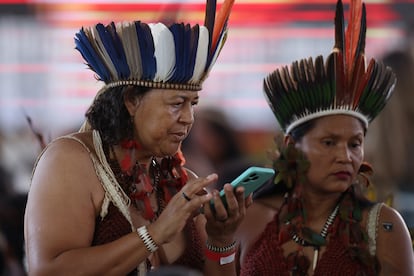X shutdown and data blackout in Brazil: Opacity fosters toxic digital environments
With the exception of YouTube, no platform operating in the Latin American country offers open and free access to its data. The lack of transparency affects the monitoring of online violence against women

In the Brazilian digital sphere, social media platforms are arenas of heated discussions and also intense toxicity, especially for women. Those who stand out in areas such as politics, science, and culture often face harassment, attacks, and an avalanche of negative comments on their online profiles that reinforce gender stereotypes.
Even insults considered “less serious,” when repeated ad nauseum, create a hostile environment that can trigger a cycle of silencing, in which important voices feel discouraged from participating in political debate or sharing their opinions. If nothing changes, institutional politics will continue to lose great female talents.
Monitoring gender-based political violence
In 2020, when the AzMina Institute, InternetLab and Núcleo Jornalismo launched MonitorA, an observatory of digital gender-based political violence, it was possible to access data from the main platforms operating in the country: the old Twitter (now X), Meta's social networks (Instagram and Facebook) and YouTube. There was also a communication channel with legal representatives of these large technology companies, who accepted suggestions and were open to fruitful conversations on how to create a safe online environment for all communities, especially those underrepresented in spaces of power.

Behind closed doors
In the first two editions, the observatory’s data and analysis helped female candidates who were victims understand the dynamics of online political violence and defend themselves in public debates and even in court proceedings. The material was also transformed into reports, content for social media, and technical reports for political advocacy.
Four years later, during the 2024 municipal elections in Brazil, the scenario our research team finds is different: we witnessed the purchase of X by billionaire Elon Musk; the closure of CrowdTangle, the tool that allowed open and free monitoring of Meta networks; and also the closure of X’s office in Brazil, followed by a decision by the Federal Superior Court (STF) that blocked the use of the platform throughout the country.
Beyond the legal discussions on digital sovereignty, it is a fact that the lack of a headquarters or a legal representative makes it difficult to comply with judicial decisions on content moderation, communication with the press, the government and the users themselves.
In the 2022 general elections, we manually analyzed more than 10,000 tweets collected in one week of campaigning. Of these, more than 3,000 were attacks and/or insults directed at just 97 female candidates. Two years later, everyday experience shows us that this violence continues, but technically, we are unable to analyze its dynamics without breaking the law.
In 2024, with access to YouTube data only, we can evaluate the conversation between voters, but not the insults directed at the candidates. So far, we have already evaluated more than 8,000 comments made in debate broadcasts, and more than half contain some kind of insult against the candidates.

Opacity scenario
Transparency and accountability mechanisms are powerful tools to address the toxicity of digital environments. But at the moment, with the exception of YouTube, no platform operating in Brazil — with or without representation in the country — offers open and free access to its data.
Our political conversation takes place there, fueling the powerful attention economy for ad sales, but it cannot be monitored. Lack of access compromises the creation and implementation of effective policies to combat digital violence, perpetuating an unsafe environment and silencing women’s voices and those of many others, such as racialized people or people with disabilities.
Urgent need for regulation
As the “data blackout” persists, it is crucial that civil society, organizations and government come together to tackle online toxicity, and that the platforms themselves wake up to the problem. Transforming this landscape starts with media education at all levels — from campaigns for standard users to training for communications industry executives and politicians — to commit to a digital space that promotes equality and respect.
In addition, we believe in the urgent need for solid public governance policies in the field of communications and technology, in a broad debate involving the public authorities and the senior management of large technology companies. Only in this way can we move toward an environment where everyone, regardless of gender, can express themselves freely and safely.
Bárbara Libório is the content director and Ana Carolina Araújo is the head of journalism and data projects at the feminist magazine AzMina.
Sign up for our weekly newsletter to get more English-language news coverage from EL PAÍS USA Edition
Tu suscripción se está usando en otro dispositivo
¿Quieres añadir otro usuario a tu suscripción?
Si continúas leyendo en este dispositivo, no se podrá leer en el otro.
FlechaTu suscripción se está usando en otro dispositivo y solo puedes acceder a EL PAÍS desde un dispositivo a la vez.
Si quieres compartir tu cuenta, cambia tu suscripción a la modalidad Premium, así podrás añadir otro usuario. Cada uno accederá con su propia cuenta de email, lo que os permitirá personalizar vuestra experiencia en EL PAÍS.
¿Tienes una suscripción de empresa? Accede aquí para contratar más cuentas.
En el caso de no saber quién está usando tu cuenta, te recomendamos cambiar tu contraseña aquí.
Si decides continuar compartiendo tu cuenta, este mensaje se mostrará en tu dispositivo y en el de la otra persona que está usando tu cuenta de forma indefinida, afectando a tu experiencia de lectura. Puedes consultar aquí los términos y condiciones de la suscripción digital.








































